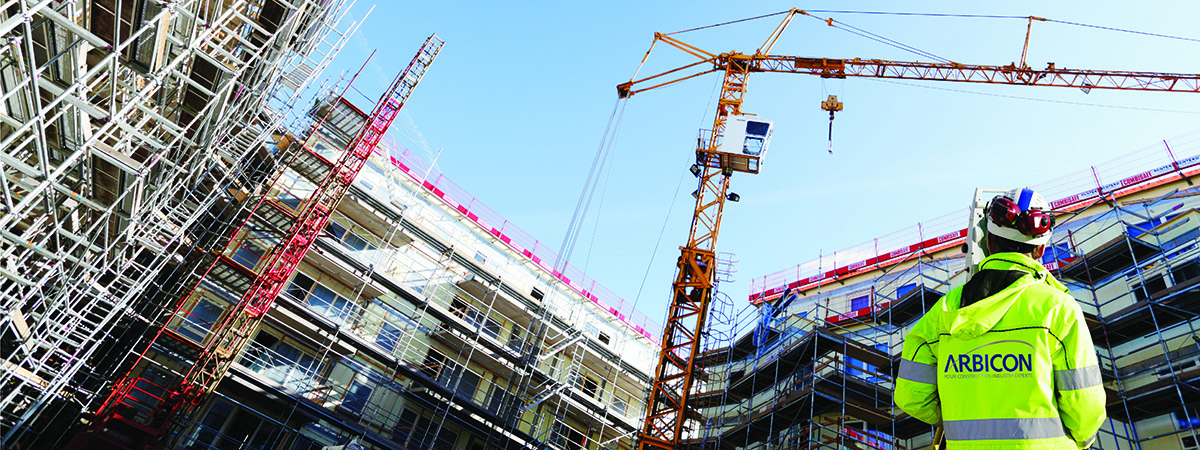10-03-2020
Arbicon are celebrating 14 years in business this year. Managing Director, Jonathan Nugent, founded the company in 2006, and reflects below on the issues that construction contractors are regularly facing, which inherently lead to construction disputes.
The UK construction and civil engineering industry has the highest level of disputes; construction projects are usually lengthy, complex processes, with numerous parties involved and it is often impossible to foresee every issue and set out a contingency at the outset. The construction industry is ripe for error, greed and dispute and when something goes wrong all hell breaks loose, where everyone gets blamed and excuses to keep the cash, irrespective of the truth, happens.Having been in the construction industry for over 40 years, as a Quantity Surveyor and then as Contract Claims Consultant, Arbitrator, Adjudicator, Mediator and Expert and ADR advocate, I have seen and been involved in over 1,000 construction disputes, being seasoned in this business I am often accused of saying it as it is! When I meet people and they ask me what I do, I have to keep it simple and tell them that I am in the construction dispute business and they always reply, “You must be busy!”. Arbicon are perpetually busy in what is the most complex and most difficult industries there is, when you look at it, circa 90% of Arbitrators and dispute resolvers are construction professionals, which tells you something!
The commercial construction contract culture and set up is like a payment food chain, with the Employer instructing the project, at the top, dealing with a Main Contractor, who subsequently deals with subcontractors, who deal with sub/subcontractors and so on. The money must transfer from the Employer at the top to the bottom of the payment food chain and profit margin must be made in the middle. There is often an imbalance in power, where the subcontractor at the bottom of the chain is forced to accept onerous terms to initially win the contract. Construction law goes some way to outlaw such practice, there are many clauses used that are void. The industry is made up of contractors where 90% are SMEs employing less than five people and these firms in particular, don’t have the commercial knowledge and resources to deal with or avoid disputes and implement commercial protection.
The most common cause of Construction Disputes
Construction disputes that arise mostly come down to money and the flow of money, where payment is the principle problem. The construction industry has its own laws to assist on payment issues through the Construction Act, providing payment rights and the right to adjudication, even if there are no contract clauses.
Typical disputes that arise and I have seen both before and during my time at Arbicon in the construction contract dispute business are in the end all about money and the flow of money, with payment being the principle problem. The construction industry has its own laws to assist on payment issues through the Construction Act, which has been around for almost 22 years, providing payment rights and the right to adjudication, even if there are no contract clauses. If you are ignored you get the money you ask for, payment in default, which has caused a lot of bother to many of the unscrupulous non-payers.
Arbicon have conducted numerous adjudications and obtained the money for Client’s through the adjudication process, but it amazes me how many firms still do not understand the law on payment or that it exists to protect them. There are two types of claim one is payment in default the other the true value of the sum due.
The best-known case of payment in default
The best-known case on the what you ask for is what you get if ignored is S&T v Grove Developments, where there was circa £14-millions in default that had to be paid without proving it. The case rules that the payer must pay a default adjudication award, before being able to adjudicate again on the true value. In theory you could legally claim £1m say, when it is worth £100,000, so the payer must be aware of the rules and the law, they must respond and deal with the payment claim or suffer the consequences of a much higher sum to pay.
Some Lawyers refer to this type of scenario as “smash and grab”, which is an inappropriate title, the law has taken years of fighting to incorporate it to combat non-payment! The title should be “payment in default when ignored!”.
Issues leading to construction disputes
Issues that arise are caused by people, either due to error, incompetence or greed. Invariably, there will be poor planning at the outset in relation to the Scope of Work identified against the agreed price and time, including design and clear documentation. Many contracts are let on an ‘all-risks’ or ‘design and build’ basis, without properly considering what is going to be built, this does not stop disputes and the Client does not get what was envisaged, ending in dissatisfaction.
Lack of quality people, lack of scope and professional input including a commercial Quantity Surveyor and designer’s assessment at the outset, often leads to arguments when ambiguity and misinterpretations arise - apparently, the main reasons why firms like Carillion went bust!
Construction Contractors often face issues and arguments other than payment that are commonplace and lead to payment disputes, including:
- Design failure
- Planning
- Professional negligence
- Fraud
- Contract interpretation/obligations
- Defects/workmanship
- Variations
- Delays
- Insolvencies
- Walk outs/termination/repudiation
- Practical completion
- Liquidated damages
- Unforeseen losses and expenses
- Notices/certificates
- Onerous clauses (pay when paid, insolvency of the employer, supplement the labour, illegal condition precedents, retentions, discounts, damage to work) to name a few.
- Contractual problems
Many construction disputes are an amalgamation of various issues; errors in design can lead to delays and additional costs that become the subject of disputes, variations can cause delays, especially when there is a substantial number, or the variations impact on work that is partially completed or nearing completion. Unreliable subcontractors can increase the risk of professional negligence and liquidated damages.
The dispute in construction contracts is often also used to try to negotiate down paying for the final account on work done, by introducing allegations as above, it is not unusual for there to be a fight then a settlement for a lesser sum. That is the nature of the construction industry.


